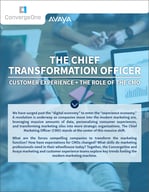From Chief Marketing Officer to Chief Transformation Officer?
Posted by Kathy Sobus on Apr 16, 2019 10:00:00 AM
Consumers are more informed than ever before, and their preferences and behaviors are constantly changing. They have dramatically higher expectations, demanding personalized service, more options, faster resolution, and a consistent experience across all channels of communication with a company. Customer loyalty is largely a prehistoric notion, given the ability for consumers to leverage and provide information and reviews online. In fact, according to LeadGenius, a customer’s first contact with a company is roughly 60% of the way through his decision timeline. As a result, companies are increasingly focused on syncing their brand pledge with the experience they deliver.
The management of customer experience is truly at the forefront of corporate strategy today. Previously a function within a company, now customer experience IS the company. A brand is defined by how a customer interacts with it, and every stage of a consumer’s journey contributes to customer experience.
You Tell Me That it’s Evolution
As businesses adapt to a consumer-first world, the role of the chief marketing officer (CMO) has transformed dramatically. With customer experience having a more measurable influence on corporate performance, CEOs and Boards of Directors are empowering their employees to take responsibility for the brand and are constantly innovating to stay ahead of customer expectations. Within this sweeping strategic shift, lines between traditional marketing roles are blurring and new positions are emerging, such as Chief Experience Officer and Chief Customer Officer. Customer experience today is a significant competitive advantage.
Progress in technology and media, as well as changing consumer behavior, are key trends driving the evolution of the CMO role. The Internet is profoundly changing the way consumers research and buy products; third parties, such as bloggers, have a greater impact on corporate reputation; and marketers need to help their companies meet the unique demands of a more diverse and global customer base. Taken together, these forces are compelling companies to transform the marketing function, as well as everything from corporate affairs and product development to distribution and manufacturing models.
Digital Disruption
Big data, increasing customer expectations, and rapid technological developments are pressuring CMOs to acquire and showcase skills that would never have been in their wheelhouse five years ago. Consumers’ reliance on digital media and mobile devices means that social sharing and online experiences have forever altered the marketing landscape, and, in turn, the tools and talents that CMOs need to drive the business and remain competitive.
We've explored the reasons why customer experience and the role of the Chief Marketing Officer are evolving. Check back for the next part of this blog series—or download the full white paper below—to see how CX and marketing can respond to these changes.
Are you evolving to meet consumers' expectations for personalized service?

As you move into the modern marketing era, you must leverage massive amounts of data to personalize consumer experiences. Together, the ConvergeOne and Avaya marketing and customer experience teams explore key trends in customer experience and its ever-expanding role in the era of data-driven marketing, analytics, and predictions.
Download our white paper to learn how to stay at the forefront of this evolution so you can continue to deliver an excellent customer experience.
Topics: Customer Experience



